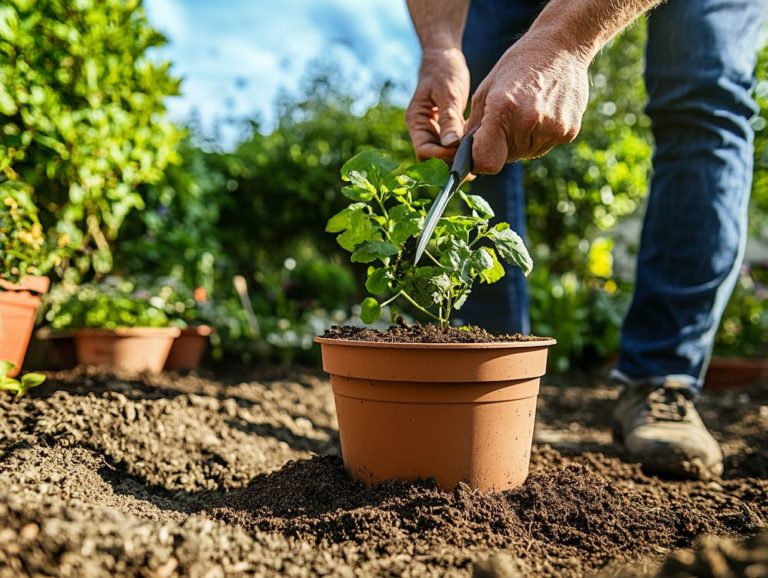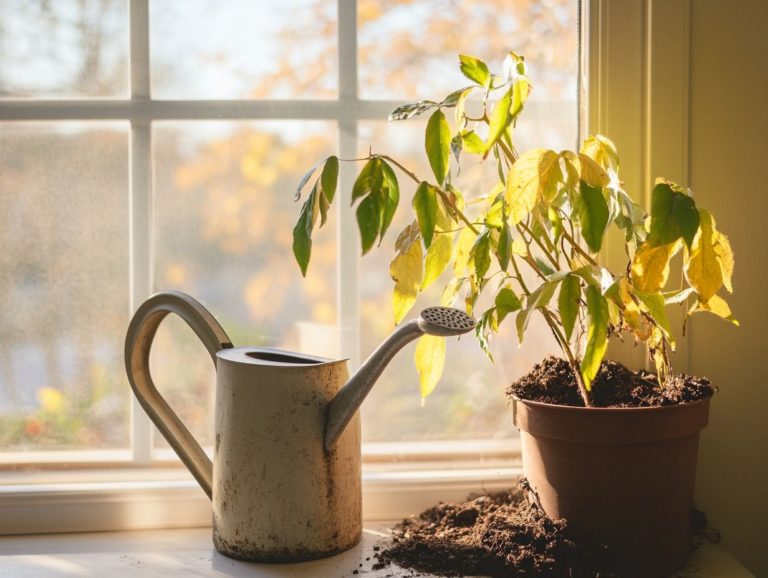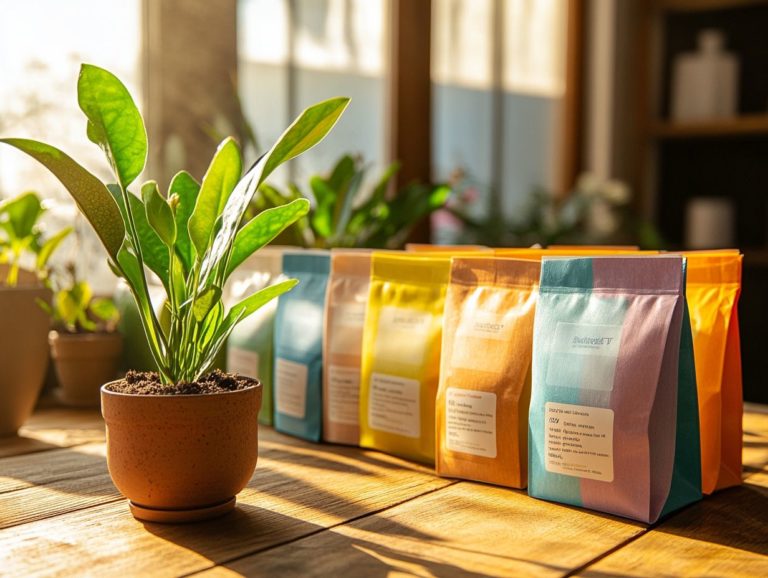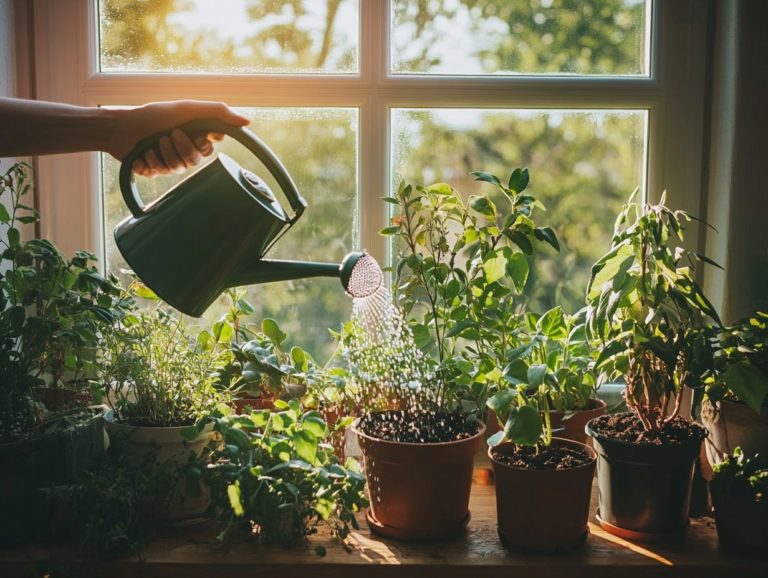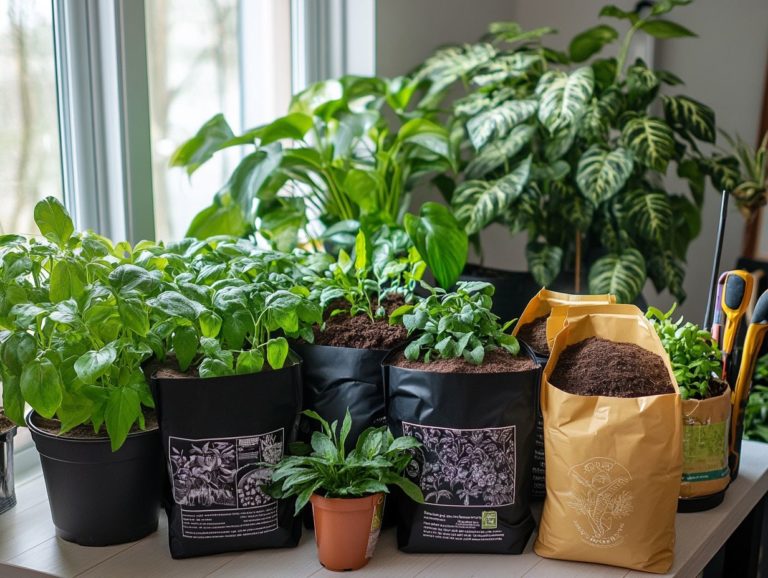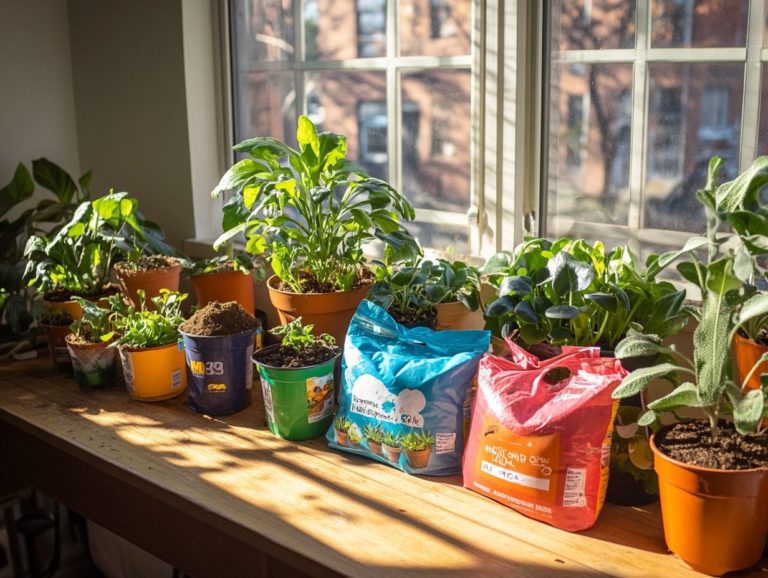Top 5 Soil Testing Kits for Home Gardeners
Soil testing is an indispensable step for any home gardener who wants to cultivate vibrant plants and achieve great harvests using a reliable tool to check soil health.
With many soil testing kits on the market, including the MySoil Test Kit and Soil Savvy Soil Test Kit, selecting the right one can feel overwhelming.
This article delves into the top five soil testing kits specifically designed for home gardeners. Options like the Luster Leaf 1662 Soil Test Kit cater to every budget and unique gardening requirement.
From rapid results to solutions tailored for organic gardening, including the importance of water content in soil and organic matter, you will also learn about the advantages of these kits.
You’ll learn how to interpret the results and discover valuable tips for maintaining healthy soil.
Dive in to find the perfect tool for your gardening journey!
Contents
- Key Takeaways:
- 1. Best Overall: Environmental Concepts 1663 Professional Soil Test Kit
- 2. Best Budget: Luster Leaf 1601 Rapitest Soil Test Kit
- 3. Best for Specific Nutrients: Luster Leaf 1605 Rapitest Digital Soil Test Kit
- 4. Best for Quick Results: Soil Savvy – Soil Test Kit
- 5. Best for Organic Gardening: LaMotte Garden Soil Test Kit
- What Are the Benefits of Using a Soil Testing Kit?
- What Nutrients Should Home Gardeners Test for?
- How Accurate Are Home Soil Testing Kits?
- What Factors Can Affect Soil Test Results?
- How Often Should a Home Gardener Test Their Soil?
- What Are the Different Types of Soil Testing Kits Available?
- What Should Home Gardeners Look for in a Soil Testing Kit?
- How Can Home Gardeners Interpret the Results of a Soil Test?
- Are There Any Alternatives to Using Soil Testing Kits?
- How Can Home Gardeners Improve Their Soil Based on Test Results?
- What Are Some Tips for Maintaining Healthy Soil in a Home Garden?
- Frequently Asked Questions
- What are the top 5 soil testing kits for home gardeners?
- How do I use the Luster Leaf Rapitest Soil Test Kit?
- What is included in the Environmental Concepts 1663 Professional Soil Test Kit?
- Can I use the Bluelab PENSOILPH pH Pen for Soil on all types of soil?
- What is the difference between the Soil Savvy Soil Test Kit and the Luster Leaf 1601 Rapitest Test Kit?
- Do I need any special equipment to use these soil testing kits?
Key Takeaways:
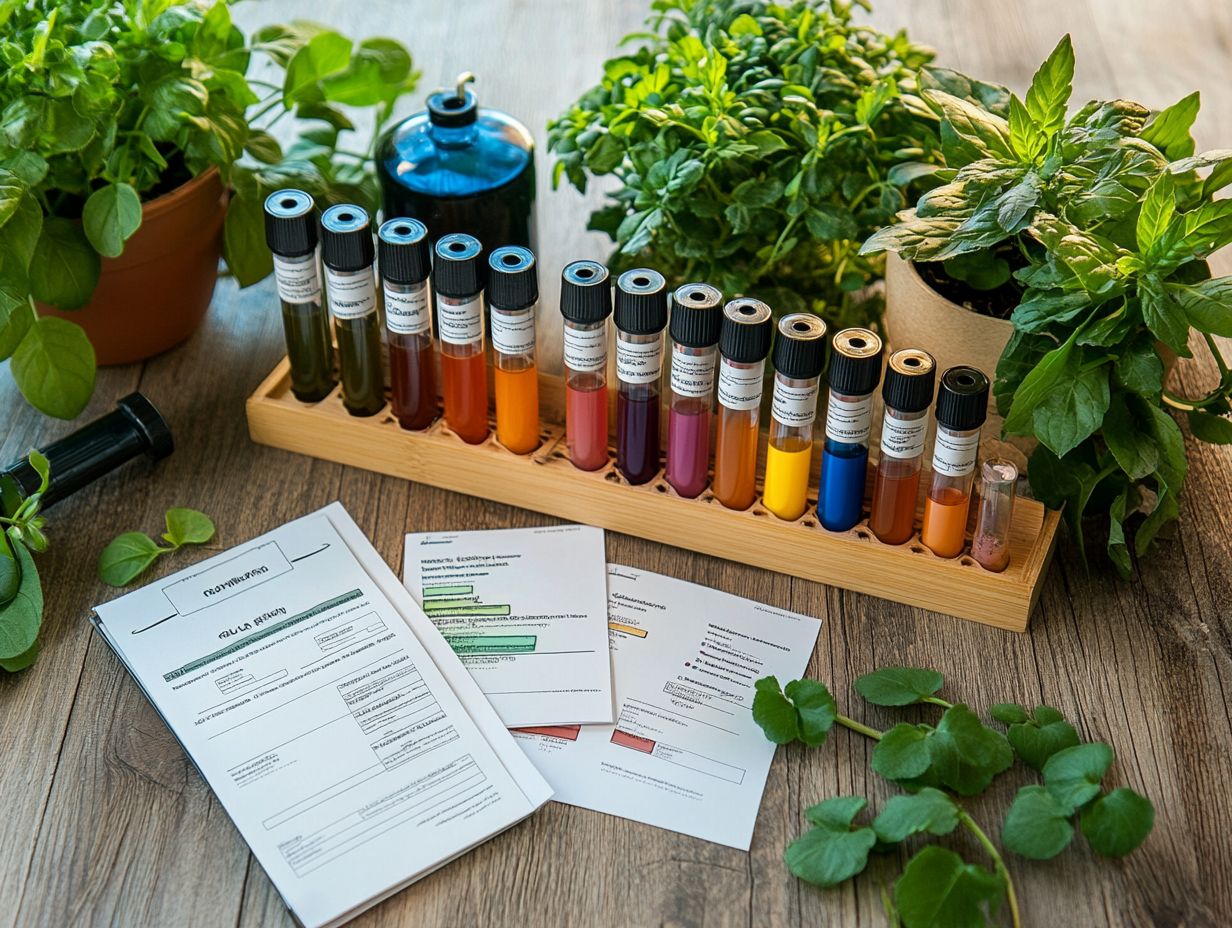
- The Environmental Concepts 1663 Professional Soil Test Kit is the best overall option for home gardeners, offering a wide range of tests and accurate results.
- The Luster Leaf 1601 Rapitest Soil Test Kit is a reliable and affordable choice for those on a budget.
- The Luster Leaf 1605 Rapitest Digital Soil Test Kit is perfect for testing specific nutrients, making it ideal for optimizing plant growth.
1. Best Overall: Environmental Concepts 1663 Professional Soil Test Kit
If you’re a gardener in search of an accurate and reliable soil testing solution that offers professional analysis comparable to a laboratory soil-test kit, the Environmental Concepts 1663 Professional Soil Test Kit is your go-to choice.
It provides the convenience of at-home testing while delivering the professional analysis needed to achieve optimal gardening results. With this kit, you receive comprehensive insights into essential soil nutrients like nitrogen, phosphorus, and potassium key players in promoting healthy plant growth and ensuring sustainable gardening practices.
One standout feature of the Environmental Concepts 1663 is its precise pH level measurements. This allows you to evaluate soil acidity and alkalinity with ease, ensuring accuracy in your gardening efforts.
This level of accuracy sets it apart from competitor products that may require more complicated procedures or lack the same reliability.
Endorsements from Kansas State University, alongside testimonials from experts like Jon Traunfeld at the University of Maryland, enhance its credibility. This makes it a trustworthy option for both novice and seasoned gardeners alike.
Unlike basic testing kits, this professional-grade solution enables you to analyze nutrient content in depth, enhancing your understanding of your soil and paving the way for greater gardening success.
2. Best Budget: Luster Leaf 1601 Rapitest Soil Test Kit
For budget-conscious gardeners, the Luster Leaf 1601 Rapitest Soil Test Kit presents an affordable yet highly effective solution for soil testing.
It provides essential insights into pH levels and nutrient availability without compromising on quality or ease of use.
This user-friendly kit is crafted for individuals who may be new to gardening. The Luster Leaf Soil Test Kit features straightforward instructions and easy-to-read results that make it incredibly accessible.
With simple color comparison charts, even novice gardeners can accurately interpret their soil conditions and make informed decisions.
The convenience of at-home testing gives you the power to understand your garden’s needs without straining your budget or relying on professional assistance.
The Luster Leaf 1601 kit, part of the popular Luster Leaf range, emerges as a practical investment. It fosters healthier growth and flourishing plants while ensuring a stress-free experience for every gardening enthusiast.
Start testing your soil today to improve your gardening experience!
3. Best for Specific Nutrients: Luster Leaf 1605 Rapitest Digital Soil Test Kit
The Luster Leaf 1605 Rapitest Digital Soil Test Kit or digital options like the Bluelab Soil pH Pen is the best choice for gardeners wanting to know the exact levels of essential nutrients. This focus enhances the accuracy of your gardening practices significantly.
Unlike many conventional testing kits that provide broad and vague results, this digital marvel employs advanced technology to deliver highly specific readings. You can easily pinpoint any deficiencies and make informed recommendations on how to amend your soil effectively.
For dedicated gardeners, the enhanced reliability of this kit, much like techniques promoted by Misti Mathis from Harvest Gold Organics, ensures that every plant receives the specific care it needs to thrive. This ultimately promotes not just growth, but overall health and yield.
Its ease of use and precise results truly set it apart, making it an invaluable asset in your gardening toolkit.
4. Best for Quick Results: Soil Savvy – Soil Test Kit
For those who value speed without sacrificing quality, the Soil Savvy Soil Test Kit or the Atree 3-in-1 Soil pH Meter lets you quickly assess your soil’s pH level and nutrient content. With this tool, you can make quick decisions that boost your garden s health!
This user-friendly kit is crafted to provide accurate insights in mere minutes, making it a transformative tool for anyone who is eager to see their garden thrive. Unlike traditional testing methods that can take days, this innovative solution gives you the power to make immediate adjustments based on real-time data.
With straightforward instructions and no need for specialized equipment, it’s designed for both novices and seasoned gardeners alike. You ll be able to address soil issues promptly, resulting in healthier plants and a more vibrant garden in no time.
5. Best for Organic Gardening: LaMotte Garden Soil Test Kit
The LaMotte Garden Soil Test Kit is tailor-made for those passionate about organic gardening. It offers invaluable insights into soil moisture and organic matter levels key elements for nurturing a thriving and sustainable garden ecosystem.
What sets this kit apart is its precise measurement tools, designed to help you assess both nutrient content and moisture retention (the soil’s ability to hold water). This ensures you create optimal conditions for your plants to flourish.
Unlike many conventional kits that often neglect the significance of organic matter, this innovative solution gives you the power to cultivate a rich, biodiverse environment.
Its user-friendly design makes it accessible for everyone, whether you’re just starting out or have years of gardening experience. By emphasizing organic practices, this comprehensive kit supports eco-friendly gardening, helping you create vibrant spaces without resorting to harmful chemicals.
What Are the Benefits of Using a Soil Testing Kit?
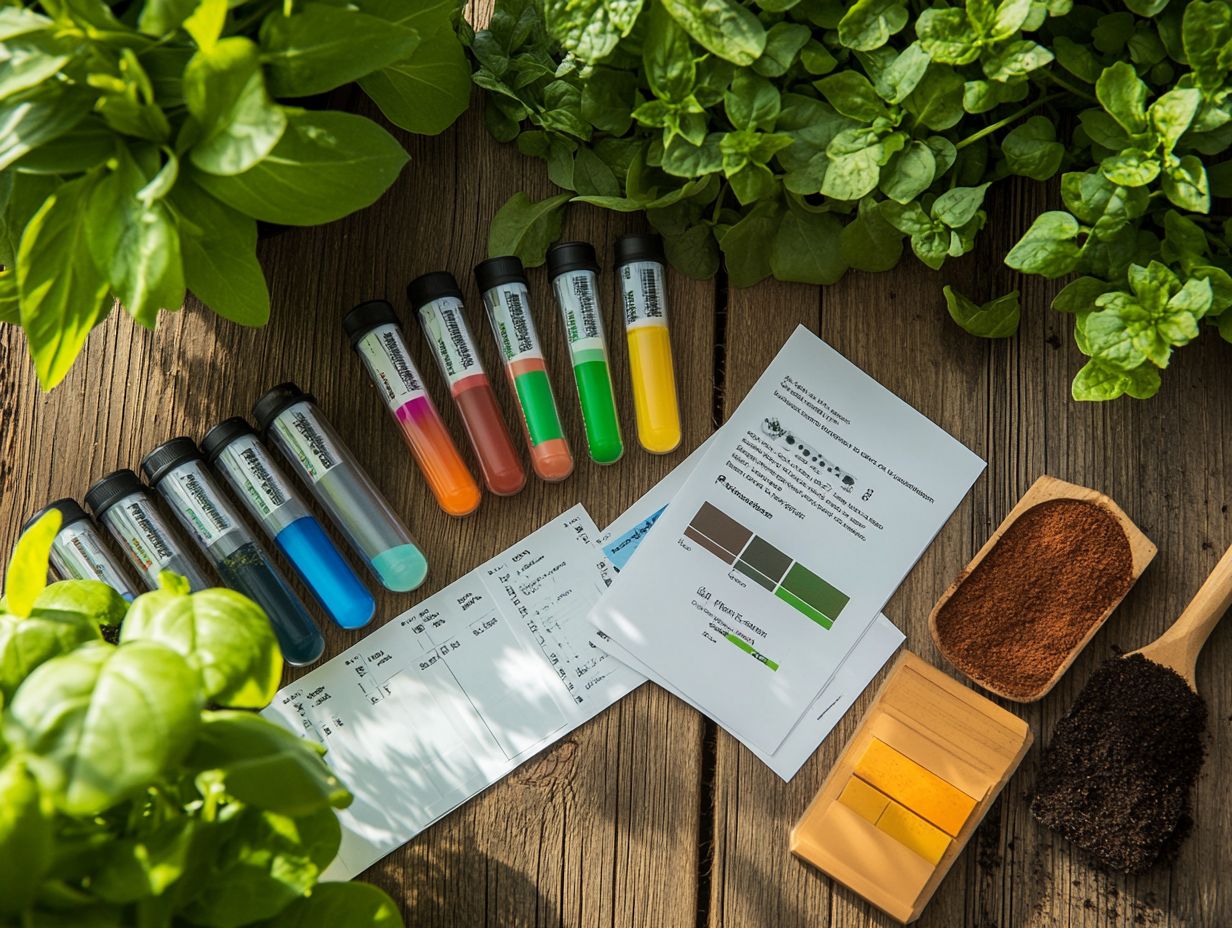
Using a soil testing kit presents a wealth of benefits. It allows you to gauge the pH level and nutrient content of your soil accurately, empowering you to make informed decisions on fertilization, plants, and overall garden health. This not only enhances your yield but also promotes sustainability.
Gardening expert Jenn Ryan highlights how these insights can lead to personalized recommendations that elevate your gardening experience. Using a soil testing kit improves plant health by pinpointing specific deficiencies or toxicities in your soil that could impact growth. This smart approach ensures your plants get just the right nutrients while minimizing the risk of over-fertilization, ultimately fostering a healthier ecosystem.
As you explore the various soil test kits available on the market, including the Whitetail Institute Laboratory Soil-Test Kit and others, you can choose the best option tailored to your unique needs, leading to better gardening results. Ultimately, these tools empower you to boost your garden’s beauty and productivity!
What Nutrients Should Home Gardeners Test for?
As a home gardener, you should routinely test for essential nutrients like nitrogen, phosphorus, and potassium. These elements are vital for plant growth and development, ensuring your garden flourishes and yields healthy crops, especially with effective nutrient management and organic practices.
These three primary macronutrients key nutrients that plants need in larger amounts significantly contribute to various growth processes within your plants. Nitrogen promotes lush green foliage and is crucial for photosynthesis; without it, you might see stunted growth and yellowing leaves. Phosphorus is essential for root development and flowering, helping your plants establish effectively. If you notice dark green or purplish leaves, it might signal a deficiency. Potassium, on the other hand, supports overall plant health, bolstering resistance to diseases and harsh weather. A lack of potassium can show up as browning leaf edges and poor fruit quality.
Conducting soil tests, including chemical tests and digital tests, can provide valuable insights into your nutrient levels, giving you the power to make informed amendments that optimize your plants’ vitality.
How Accurate Are Home Soil Testing Kits?
The accuracy of home soil testing kits can vary significantly. Some kits may provide results that closely align with professional analysis, while others might present big differences, especially when it comes to measuring pH levels and nutrient content.
This variation can stem from several factors, including the specific type of kit you choose, such as the Luster Leaf 1605 Digital Soil Test Kit, and how closely you follow the provided instructions. Inaccuracies may creep in due to user error; whether it s improper sample collection or measurement techniques, any misstep can skew results.
Additionally, the natural makeup of your soil like its texture, organic matter content, and moisture levels can influence how well these kits perform.
When you compare at-home kits to laboratory tests, which employ advanced methodologies and equipment, the limitations of DIY testing become crystal clear. Understand these shortcomings to make better choices about your soil health.
What Factors Can Affect Soil Test Results?
Several factors can significantly influence your soil test results, including moisture levels, organic matter content, and the specific pH level (acidic or alkaline level) of the soil. Each of these elements plays a critical role in the overall health and effectiveness of your gardening practices.
Understanding how these variables interact is essential for achieving optimal gardening outcomes. For example, excessive moisture can skew nutrient levels, while insufficient organic matter may obscure the soil’s true fertility.
To enhance the accuracy of your test outcomes, consider amending the soil with compost or well-rotted manure before sampling. It s also wise to conduct tests when the soil is moist but not overly wet, allowing for a more precise measurement of nutrient availability.
By taking these practical steps, you can significantly improve the reliability of your results, ultimately guiding you toward better gardening decisions.
How Often Should a Home Gardener Test Their Soil?
Make it a priority to test your soil at least once a year preferably before the planting season! This gives you the latest insight into nutrient levels and soil health. Act now to adjust your soil based on what the tests reveal!
By scheduling your soil testing in late winter or early spring, you provide yourself with ample time to amend the soil before planting, setting the stage for optimal growth conditions for a range of plants. It s also wise to consider a second test in late summer to evaluate the effects of your gardening practices. This can help uncover any deficiencies or imbalances that need to be addressed before the next planting cycle.
Frequent soil testing not only reveals your nutrient needs but also aids in managing pH levels, improving drainage, and fostering a healthier ecosystem. This ultimately leads to a more productive garden. By sticking to a regular testing schedule, you can cultivate success and enhance your gardening endeavors over time.
What Are the Different Types of Soil Testing Kits Available?
You ll find a wide variety of soil testing kits on the market today, from innovative digital options like the MySoil Test Kit and Soil Savvy to traditional kits such as the Luster Leaf series. Each is designed to meet different gardening needs and preferences.
These kits empower you by offering valuable insights into soil health, nutrient levels, and pH balance. Digital kits are particularly lauded for their user-friendliness; a few simple clicks can provide instant feedback and detailed reports straight to your smartphone or tablet. Products such as the Atree 3-in-1 Soil pH Meter and Garden Tutor Soil pH Test Strips Kit exemplify this trend.
On the other hand, traditional chemical testing kits while a bit more hands-on offer a reliable, time-honored approach. The accuracy of results can fluctuate based on the method, leading many to gravitate toward digital solutions for their convenience.
Yet, some gardeners argue that physical tests provide a more tactile experience and a deeper understanding of the soil. Each option has its unique merits, ultimately depending on your personal preference.
What Should Home Gardeners Look for in a Soil Testing Kit?
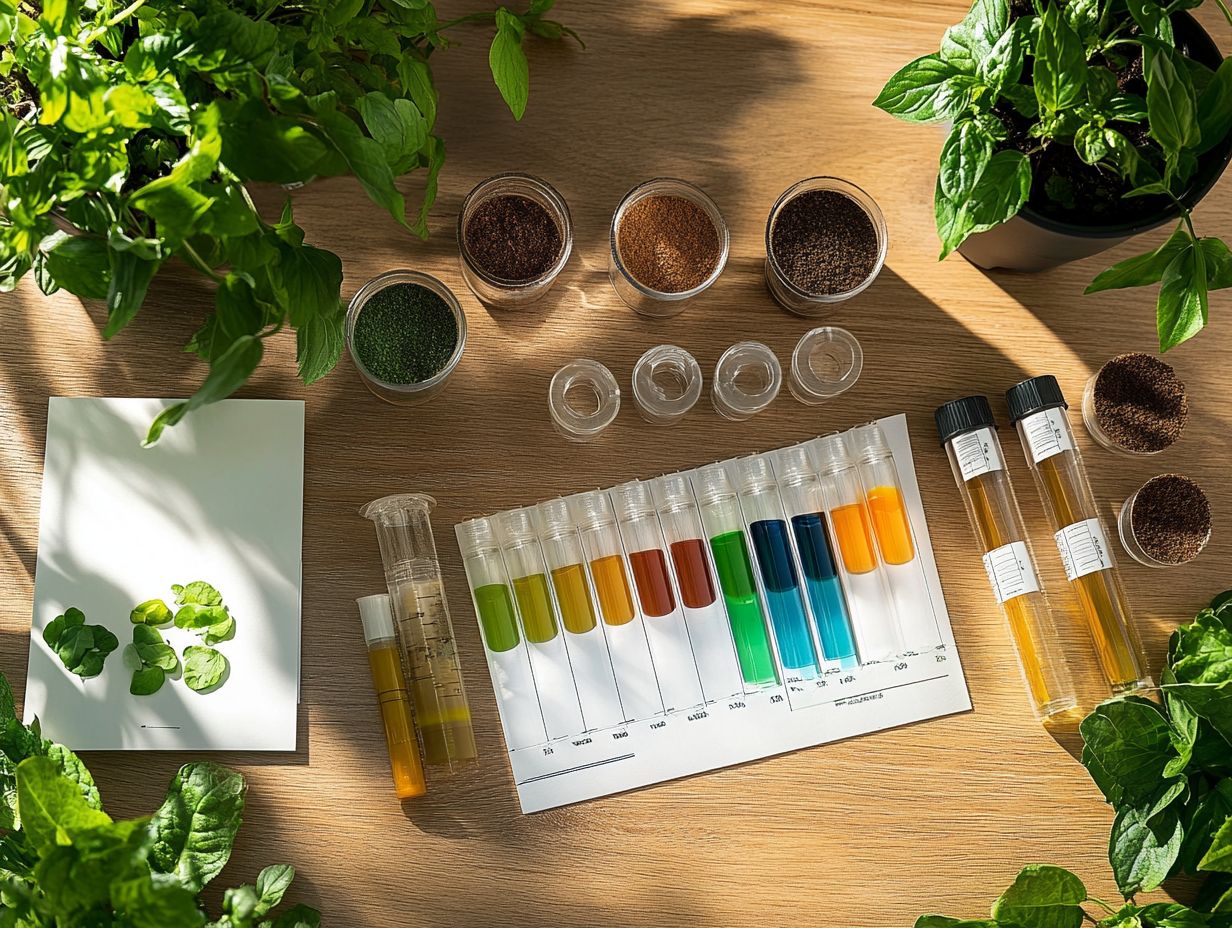
When selecting a soil testing kit, you should prioritize several key factors: ease of use, accuracy in measuring pH levels and nutrient content, and the ability to provide actionable recommendations based on the test results, as emphasized by experts such as Jon Traunfeld from the University of Maryland.
Beyond these essentials, consider the variety of tests offered by the kit. Some kits provide more comprehensive analyses, including moisture levels and soil texture assessments, which can be invaluable for your gardening efforts. Such options include the Whitetail Institute Laboratory Soil-Test Kit and the Bluelab Soil pH Pen.
The level of detail in the results can significantly enhance your gardening experience; detailed insights serve to illuminate any specific nutrient deficiencies or imbalances you may face.
Pay attention to user reviews that often spotlight reliability and overall satisfaction, while expert recommendations from sources like Popular Mechanics can steer you toward kits that excel in both accuracy and simplicity. Ultimately, a thoughtful selection process can pave the way for healthier plants and a more fruitful gardening endeavor.
How Can Home Gardeners Interpret the Results of a Soil Test?
Understanding how to interpret the results of a soil test is essential for you as a home gardener. It gives you the power to make informed decisions about soil amendments and nutrient applications, fundamentally enhancing your gardening practices, as emphasized by gardening expert Jenn Ryan at Kansas State University.
By exploring key components like pH levels, which indicate the acidity or alkalinity of your soil, you can tailor your approach. A balanced pH is crucial for the best access to nutrients; knowing whether your soil skews acidic or alkaline allows you to make the necessary adjustments.
Analyzing nutrient concentrations, especially macronutrients (nitrogen, phosphorus, and potassium), provides insights into what your plants might be missing and which fertilizers will be most beneficial. Understanding organic matter content is vital as well, as it improves soil structure, water retention, and overall fertility. Incorporating organic materials such as Harvest Gold Organics can create a thriving environment for your plants.
Are There Any Alternatives to Using Soil Testing Kits?
While soil testing kits are a popular choice among home gardeners, you have several alternatives at your disposal, including professional analysis services from reputable labs and DIY methods that can offer valuable insights into your soil’s health and nutrient content.
If you re seeking a more comprehensive assessment, professional lab testing could be an excellent route. These services utilize advanced techniques and equipment to accurately determine soil composition, pH levels, and nutrient availability. However, this option does come with a cost, which may not be practical for everyone. It s essential to weigh your options against your gardening goals.
Alternatively, you can rely on observational methods. Monitoring the health and growth patterns of your plants allows you to gauge your soil’s condition without the financial or time investment associated with laboratory tests. This can be particularly advantageous for those tending to small, home-scale gardens or seasoned gardeners who can discern subtle signs of soil deficiency based on their plants’ responses, as highlighted by experts such as Misti Mathis.
How Can Home Gardeners Improve Their Soil Based on Test Results?
You can boost your soil health and gardening success by implementing targeted approaches based on soil test results, as recommended by gardening expert Misti Mathis. This ensures that you effectively address specific nutrient deficiencies and pH imbalances.
Incorporating organic matter such as compost will enrich your soil with beneficial microorganisms and improve moisture retention, creating a thriving environment for your plants.
If your soil test indicates a nitrogen deficiency, apply a balanced fertilizer immediately to restore balance. Natural options like alfalfa meal can also provide that crucial nutrient.
For those dealing with overly acidic soil, lime becomes a valuable pH adjuster not only enhancing nutrient availability but also promoting overall soil structure. These actionable strategies, backed by expert insights, empower you to cultivate vibrant and productive gardens year after year while embracing sustainable gardening practices.
What Are Some Tips for Maintaining Healthy Soil in a Home Garden?
Maintaining healthy soil is crucial for your gardening success. You can achieve this by adopting various best practices aimed at boosting organic matter, enhancing moisture retention, and ensuring a balanced nutrient profile. These tips are highlighted by gardening expert Jenn Ryan from Kansas State University.
To cultivate rich, fertile ground, consider implementing crop rotation. This technique prevents nutrient depletion and curbs the build-up of diseases and pests. Incorporating organic matter, such as compost or aged manure, significantly improves soil structure. It also boosts the activity of tiny organisms in the soil, promoting a healthier ecosystem in your garden.
Keep an eye on moisture levels to keep your plants thriving! This helps you avoid the pitfalls of overwatering or drought conditions, both of which can harm plant health. By following these recommendations, you ll not only support the ecosystem of your garden but also embrace sustainable practices that pave the way for long-term success.
Frequently Asked Questions
What are the top 5 soil testing kits for home gardeners?
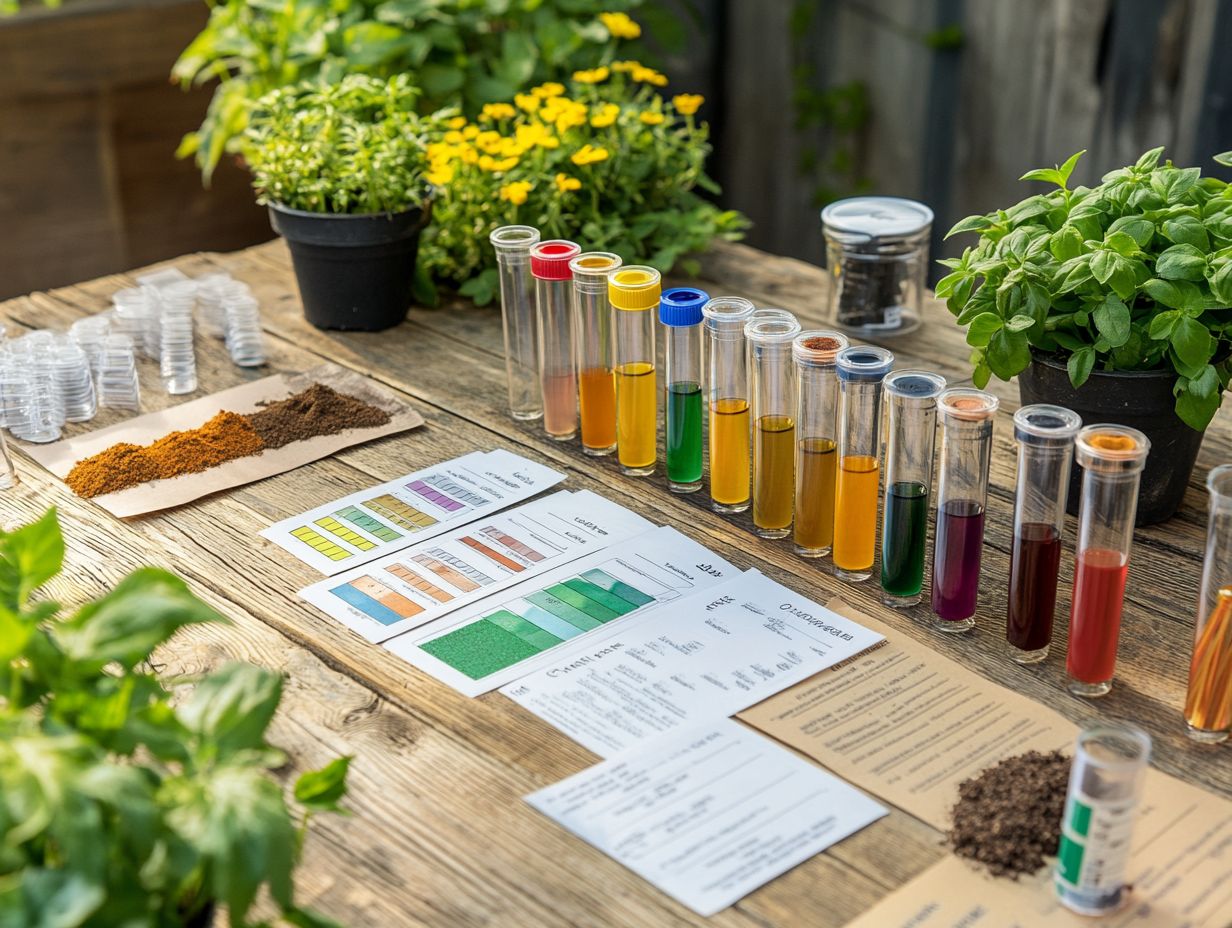
The top 5 soil testing kits for home gardeners are the Luster Leaf Rapitest Soil Test Kit, the Environmental Concepts 1663 Professional Soil Test Kit, the Bluelab PENSOILPH pH Pen for Soil, the Soil Savvy Soil Test Kit, and the Luster Leaf 1601 Rapitest Test Kit. These options provide reliable recommendations for accurate at-home testing.
How do I use the Luster Leaf Rapitest Soil Test Kit?
To use the Luster Leaf Rapitest Soil Test Kit, mix a small amount of soil with the included test capsules and water. Then, compare the color of the solution to the included color chart. This will help you determine the pH level, nitrogen, phosphorus, and potassium levels of your soil, as well as the moisture and organic matter content.
What is included in the Environmental Concepts 1663 Professional Soil Test Kit?
The Environmental Concepts 1663 Professional Soil Test Kit includes 40 test capsules, a color comparison chart, a durable carrying case, and detailed instructions for conducting a comprehensive soil analysis. This allows for professional analysis that enhances sustainable gardening practices.
Can I use the Bluelab PENSOILPH pH Pen for Soil on all types of soil?
Yes, the Bluelab PENSOILPH pH Pen for Soil can be used on all types of soil, including sandy, loamy, and clay soils. It can also be used on soil in outdoor gardens and indoor potted plants, ensuring ease of use for all gardeners.
What is the difference between the Soil Savvy Soil Test Kit and the Luster Leaf 1601 Rapitest Test Kit?
The Soil Savvy Soil Test Kit, recommended by gardening expert Jenn Ryan, provides a detailed analysis of 14 different nutrients in your soil. In contrast, the Luster Leaf 1601 Rapitest Test Kit only tests for pH, nitrogen, phosphorus, and potassium levels. The Soil Savvy test analyzes soil in a lab, while the Luster Leaf test is a quick and easy at-home test suitable for McKinney, Texas gardeners.
Do I need any special equipment to use these soil testing kits?
No, all of the top 5 soil testing kits for home gardeners listed above come with everything you need to conduct a soil test. This includes test capsules, color comparison charts, and detailed instructions. The Bluelab PENSOILPH pH Pen may require occasional calibration, but this can be done easily with a calibration solution recommended by the agricultural department.

